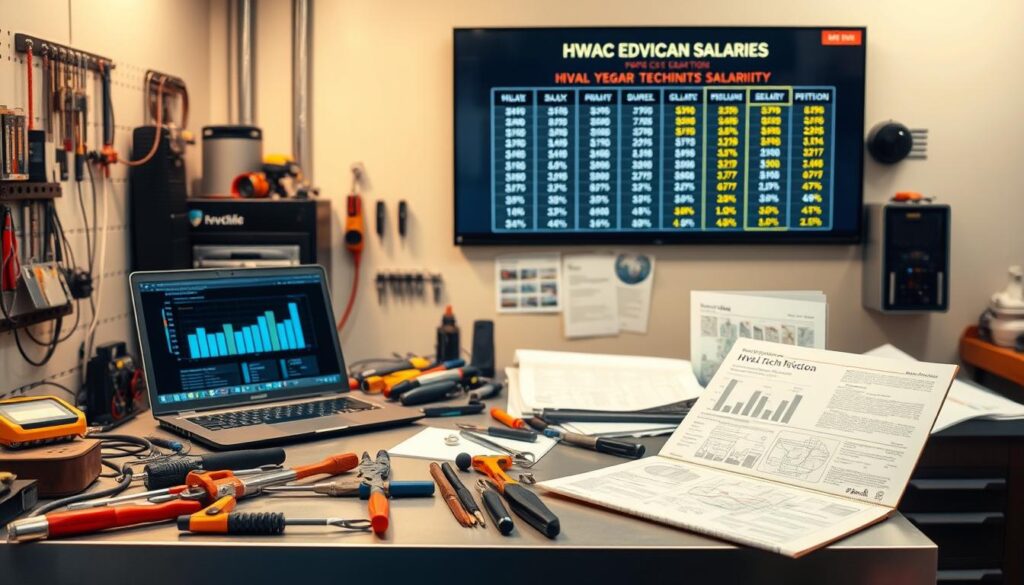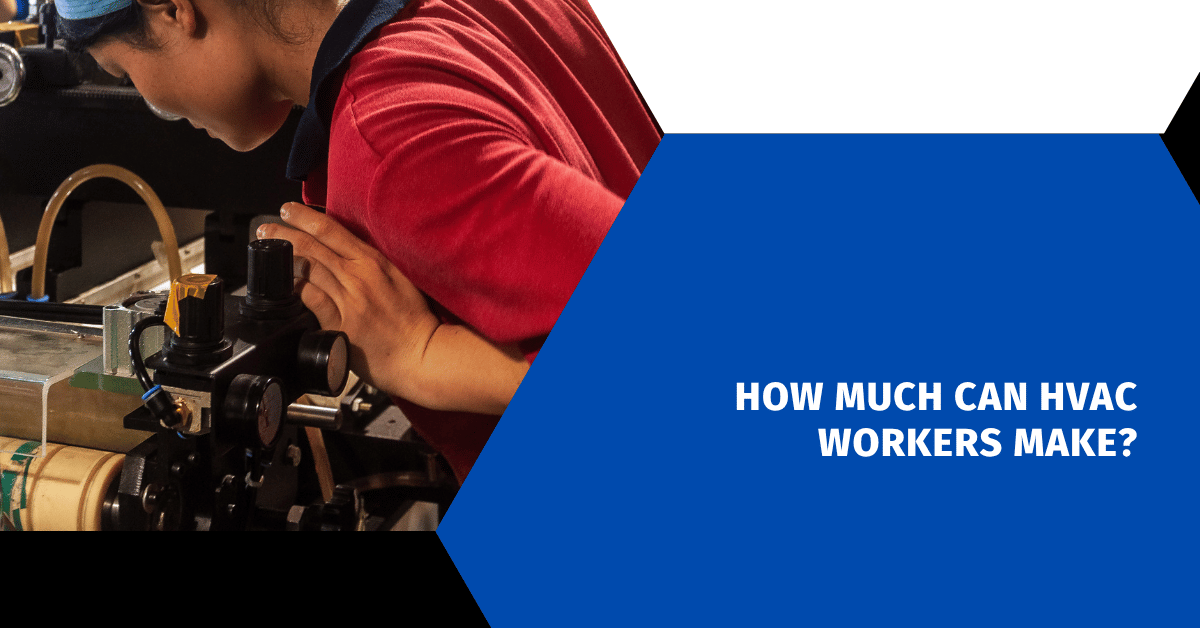Affiliate Disclosure
HVAC Guide Guys is a participant in the Amazon Services LLC Associates Program, an affiliate advertising program designed to provide a means for sites to earn advertising fees by advertising and linking to Amazon.
How Much Can HVAC Workers Make? Are you thinking about a career that’s both technical and rewarding? HVAC technician salaries might just surprise you. It’s like finding the perfect cool breeze on a hot summer day.

People in the HVAC field are making good money. The average HVAC technician salary is now $49,500 a year. There’s also room for growth and moving up in the field.
Your earnings in HVAC can change a lot. It depends on your experience, what you specialize in, and where you work. If you’re starting out or looking to move up, knowing how much you can earn is key. It could lead to a stable and fulfilling career.
Key Takeaways
- Average HVAC technician salary is $49,500 per year
- Earnings vary by experience and specialization
- Multiple factors influence HVAC worker compensation
- Career offers strong growth
- Specialization can significantly boost income
Table of Contents
Understanding HVAC Technician Salary Ranges
Your earnings as an HVAC technician can change a lot based on your experience and skills. The HVAC field has good pay for those who keep learning and growing. Knowing the salary range helps you plan your career and set financial goals.
Entry-Level HVAC Salaries
At the start, HVAC techs make about $22-$25 an hour. These first earnings show the basic skills and little experience of new workers.
- Starting wage range: $22-$25 per hour
- Annual salary: $45,000-$52,000
- Typical job responsibilities include basic installations and maintenance
Experienced Technician Earnings
As you get better, your pay goes up a lot. Technicians with 5-10 years of experience see big salary jumps.
| Experience Level | Hourly Rate | Annual Salary |
|---|---|---|
| Mid-Level Technician | $26-$30 | $54,000-$62,000 |
| Senior Technician | $30-$35 | $62,000-$73,000 |
Top-Tier HVAC Income
Top earners in HVAC make over $75,000 a year. They have lots of experience and often manage or specialize in certain areas.
- Specialized certifications increase earning power
- Management positions offer higher compensation
- Technical expertise drives income growth
Your commitment to skill development directly impacts your earning in the HVAC industry.
Explore Our HVAC Shop
Looking for top-rated HVAC tools, parts, and accessories? Visit our shop and find the perfect solution for your needs.
Visit the ShopFactors Affecting HVAC Worker Compensation
Understanding hvac installer wages involves looking at several key factors. Your pay depends on many things that can change your income a lot.
The main things that affect hvac service pay rates are:
- Professional Experience: More years of experience means higher pay
- Technical Skills: Having advanced certifications and knowledge raises your value
- Geographic Location: Pay varies by region due to local demand
- Industry Specialization: Commercial, residential, and industrial HVAC have different pay levels
Getting better at skills not just technical can really help your pay. Skills like sales, customer service, and business management can make a big difference in your career.
Companies value technicians who are good at both technical skills and working with people. To earn more, keep learning, get more certifications, and stay up-to-date with new HVAC tech.
Successful HVAC professionals know that pay is not just about technical skills. It’s about adding value for employers and clients.
By understanding these factors, you can earn more and grow in the HVAC service industry.
Geographic Location Impact on HVAC Salaries
Your HVAC maintenance pay can change a lot based on where you work. Location is key in figuring out how much HVAC repair pros can earn in the U.S.
HVAC repair earnings vary a lot from state to state and region to region. Knowing these differences can help you choose the best career path and earn more.
Highest Paying States for HVAC Professionals
Some states pay HVAC pros a lot more than others. The highest paying states are:
- Alaska: Known for extreme climate challenges
- Massachusetts: Strong industrial and residential infrastructure
- Washington: Tech-driven market with high demand
- Connecticut: Robust commercial HVAC sector
- California: Diverse climate requirements
Regional Market Differences
HVAC repair pay changes with regional economic conditions, population density, and industry needs. Cities usually pay more because of high demand and complex jobs.
“Location can significantly impact your earning in the HVAC industry” – HVAC Career Insights
Cost of Living Considerations
When comparing salaries, remember the local cost of living. A high salary in an expensive city might not mean more money in your pocket than a lower salary in a cheaper area.
- High-cost areas: New York, San Francisco
- Moderate-cost regions: Texas, Colorado
- Lower-cost states: Mississippi, Arkansas
Pro tip: Research local market rates and living expenses before making relocation decisions in your HVAC career.
Experience Levels and Salary Growth
Your earning chances in the HVAC trade grow as you gain more experience. HVAC workers see their salaries rise as they move up in their careers. The early years are key in setting your income and reputation.
As you work, your salary will grow in a clear pattern. New technicians start with lower pay, but learning new skills can boost your earnings. The more you work, the more you can earn.
- First 1-2 Years: Learn basic skills and knowledge
- 3-5 Years: Gain specialized skills and improve your tech abilities
- 6-10 Years: Get ready for senior roles and leadership
- 10+ Years: Aim for management and higher pay
Those new to the field earn about $22.47 an hour. But, with over 10 years of experience, you can make up to $32.83 an hour. This shows how learning and growing can really pay off.
Getting certifications, staying updated with training, and improving your skills are important for making more money. Your hard work in learning and growing will lead to better pay and more career chances.
Explore Our HVAC Shop
Looking for top-rated HVAC tools, parts, and accessories? Visit our shop and find the perfect solution for your needs.
Visit the ShopHow Much Can HVAC Workers Make in Different Specializations
HVAC technician salaries vary a lot based on the specialization. Your earnings depend on the sector you choose. Knowing these differences helps you make better career choices and increase your income.
Exploring HVAC worker earnings, it’s key to see the unique chances in different fields:
Commercial HVAC Earnings
Commercial HVAC techs usually earn more than those working on homes. The complexity of big systems and tech needs lead to better pay. Special skills in commercial HVAC can mean:
- Higher base salaries
- More complex project work
- Opportunities for system design
Residential Service Income
Residential HVAC techs work on home systems. They might earn less than commercial techs but have:
- Steady demand
- Consistent work opportunities
- Potential for a loyal customer base
Industrial HVAC Compensation
Industrial HVAC specialists handle complex systems in factories. They often get the highest pay due to:
- Specialized technical knowledge
- High-risk environment requirements
- Advanced certification needs
Your HVAC earnings depend on your skill development and certifications. Continuous learning can greatly improve your salaries in all areas.
Career Advancement and Income Opportunities

To grow your HVAC career, you need a plan and ongoing learning. Your earning power goes beyond the first job. By investing in your skills, you can find big financial rewards in the HVAC field.
Here are some ways to boost your hvac job income:
- Pursue advanced technical certifications
- Develop specialized expertise in emerging technologies
- Enhance leadership and management skills
- Explore entrepreneurial opportunities
Getting more certifications can really up your value in the market. Specialized skills in commercial refrigeration, green tech, or industrial systems make you stand out. This can lead to higher pay.
Looking into management roles can also increase your earnings. Jobs like operations supervisor, project manager, or technical trainer offer better pay. These roles use your technical skills and offer more money.
“The most successful HVAC professionals continuously learn and adapt to industry changes.”
Networking and making professional connections are key to moving up. Go to industry events, join professional groups, and keep up with tech news. This helps you stay ahead in the fast-changing HVAC world.
Your success depends on growing your skills, embracing new tech, and being proactive in your career.
Benefits and Additional Compensation
HVAC pros get more than just their base pay. Employers often give out big compensation packages. Knowing these extras can help you earn more in the HVAC field.
Your total pay as an HVAC tech includes many key parts. These parts can really up your earnings. It makes the job even more appealing for skilled workers.
Health Insurance and Retirement Plans
Top HVAC companies offer great benefits. These include:
- Comprehensive health insurance coverage
- 401(k) retirement savings plans
- Dental and vision insurance
- Life insurance options
Overtime and Bonus Structures
HVAC pay can go up a lot with overtime. Many techs make extra money by working extra hours. This is true, more so during busy times.
| Compensation Type | Potential Earnings Boost |
|---|---|
| Standard Overtime | 1.5x Base Rate |
| Holiday Overtime | 2x Base Rate |
| Performance Bonuses | $500-$5,000 Annually |
Commission-Based Earnings
Some HVAC firms have commission plans. Successful techs can earn a lot more through:
- Selling new systems
- Upselling maintenance contracts
- Doing big installations
By using these extra pay chances, you can make more in the HVAC world.
Explore Our HVAC Shop
Looking for top-rated HVAC tools, parts, and accessories? Visit our shop and find the perfect solution for your needs.
Visit the ShopEducation and Certification Impact on Earnings

Investing in education and certifications can really boost your earnings in HVAC. The right credentials lead to better-paying jobs in the field.
Getting certified can change your career and earnings. It shows you’re an expert and dedicated to your work. This makes you more valuable to employers.
- EPA 608 Certification: A must for working with refrigerants
- NATE (North American Technician Excellence) Certification: Shows you have advanced skills
- HVAC Excellence Certification: Confirms you know a lot about the industry
Certifications can greatly increase your income. Certified technicians can make up to 20% more than those without certifications.
| Certification | Average Salary Increase | Career Impact |
|---|---|---|
| EPA 608 | 10-15% | Needed for refrigerant work |
| NATE | 15-20% | Recognizes advanced technical skills |
| HVAC Excellence | 20-25% | Shows deep industry knowledge |
Investing in education and certifications is worth it. Programs cost $500-$2,000 but can lead to much higher earnings over time.
“Continuous learning is the key to career advancement in HVAC” – Industry Expert
Showing you’re committed to learning makes you stand out. Employers look for technicians who keep improving their skills and knowledge.
Self-Employment and Business Ownership Income
Exploring hvac trade income opportunities through self-employment can unlock significant earning. Starting your own HVAC business is a powerful way to financial freedom. It can also lead to higher income than traditional jobs.
Business ownership in the hvac field offers unique benefits:
- Unlimited income beyond standard wages
- Control over pricing and growth
- Ability to expand services
- Direct customer relationships
Successful HVAC business owners can earn a lot. Many report making $75,000 to $150,000 a year. This depends on market demand and business skills.
| Business Stage | Estimated Annual Income | Key Considerations |
|---|---|---|
| Startup Phase | $50,000 – $75,000 | Building client base, establishing reputation |
| Established Business | $100,000 – $150,000 | Multiple service contracts, expanded service area |
| Advanced Operations | $150,000 – $250,000 | Multiple technicians, diverse service offerings |
To succeed in HVAC business, focus on technical skills, marketing, customer service, and continuous learning. These steps are key to success.
“Your technical expertise combined with smart business strategies can transform your HVAC career into a lucrative entrepreneurial journey.”
Starting a business comes with challenges like startup costs and marketing. Strategic planning and persistent effort are needed to overcome these. They can help build a thriving HVAC business.
Explore Our HVAC Shop
Looking for top-rated HVAC tools, parts, and accessories? Visit our shop and find the perfect solution for your needs.
Visit the ShopIndustry Growth and Future Earning
The HVAC industry is on the verge of big changes. This is great news for technicians looking to make more money. New technologies and market changes are making HVAC technician salaries better and opening up new career paths.
Market Demand Projections
Experts say the HVAC sector will grow a lot. The Bureau of Labor Statistics predicts a 5% increase from 2020 to 2030. This means good pay for skilled workers.
- Estimated job growth: 5% annually
- Approximately 38,500 new HVAC positions expected
- Increasing demand in residential and commercial sectors
Technology Impact on Wages
New tech is opening up more earning chances for HVAC workers. Smart home systems and advanced climate control are making jobs more specialized. This could lead to higher salaries.
- IoT integration in HVAC systems
- Digital diagnostic tools
- Advanced energy management technologies
Green Energy Opportunities
Sustainable energy is changing the HVAC world. Technicians who focus on green tech can earn more. This is because businesses and homeowners want to save energy.
- Solar-powered HVAC systems
- Energy-efficient equipment installation
- Renewable energy certifications
By being flexible and always learning, HVAC pros can take advantage of these trends. They can find rewarding and well-paying jobs in this fast-changing field.
Conclusion
The HVAC industry is both exciting and rewarding. It offers a chance to earn between $46,000 and $68,000 a year. With the right skills and development, your earnings can grow even more.
Your income in HVAC depends on your skills, where you work, and your ability to learn new tech. Choosing to specialize can really boost your earnings. Getting extra certifications or starting your own business can also make a big difference.
The HVAC field is set to grow, thanks to green energy and new climate control systems. By keeping up with trends and improving your skills, you can secure a stable and well-paying job. This field offers a lot of opportunities for growth.
To succeed in HVAC, focus on growing professionally, staying technically skilled, and being open to change. With the right mindset, you can build a career that’s both rewarding and financially stable.

